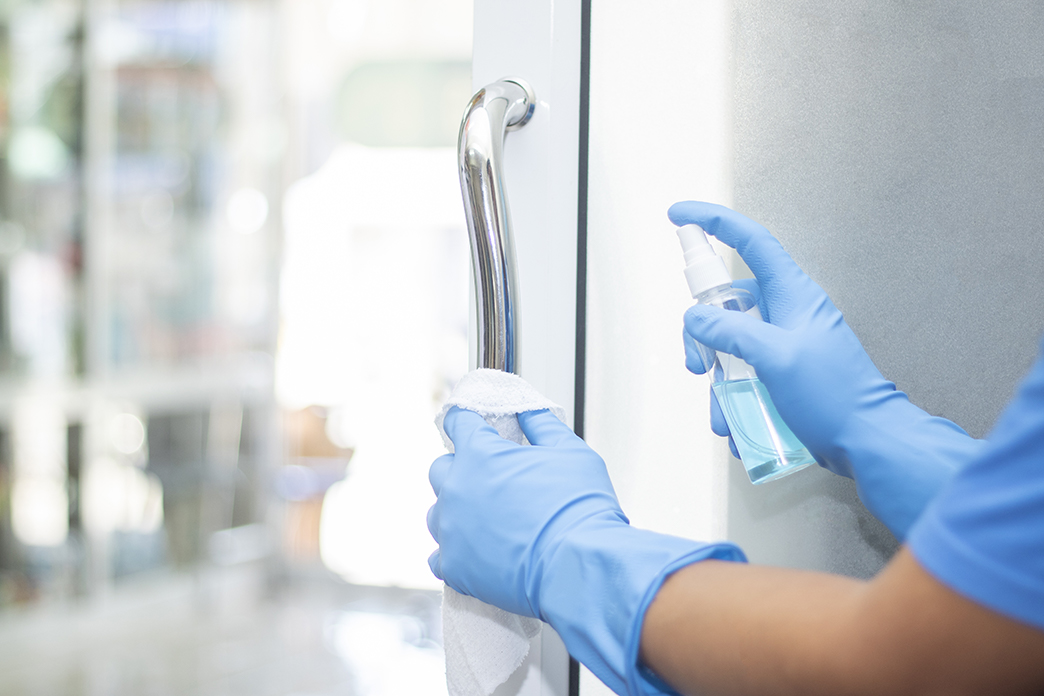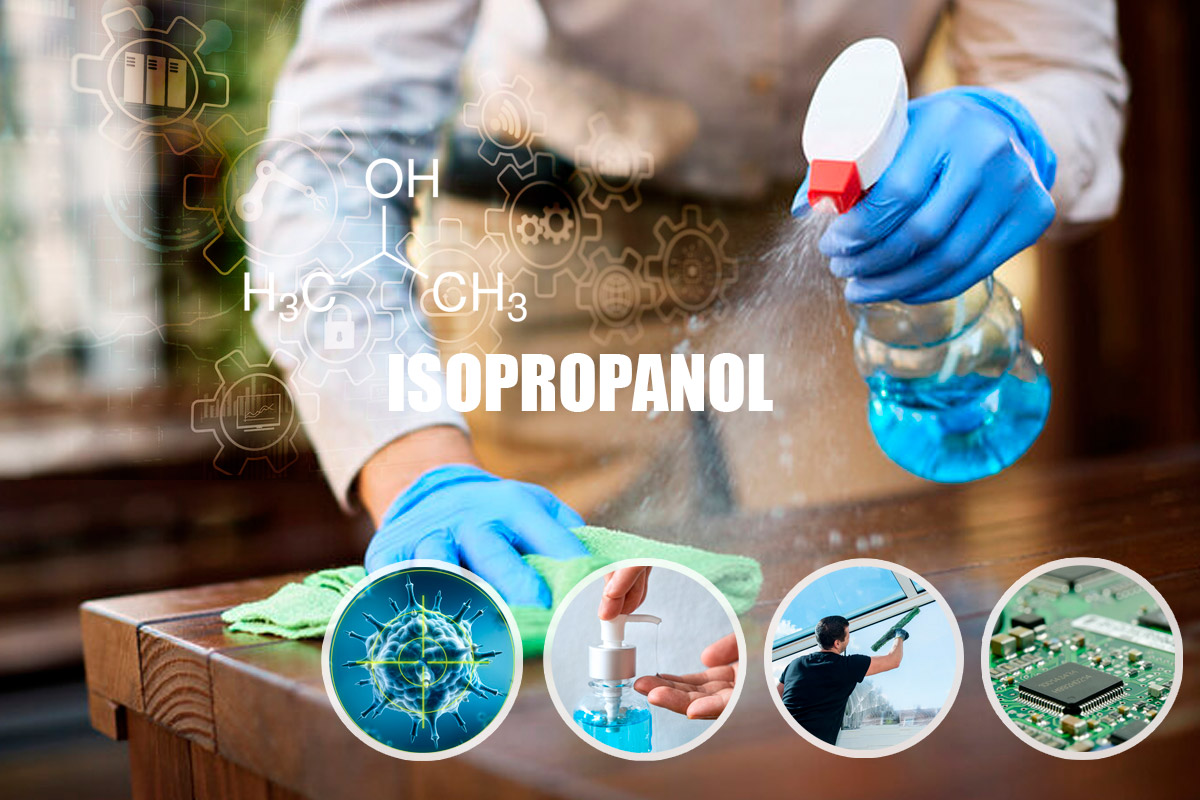
All-rounder Isopropanol – the ideal solution for cleaning and disinfection
Isopropanol, also known as isopropyl alcohol, is a true multitasker in the world of cleaning and disinfecting agents. Whether in medicine, technical laboratories, or households – this versatile alcohol has established itself as an indispensable helper. In this article, we delve into the history, chemical properties, and diverse applications of this fascinating substance.
The History of Isopropanol
First produced in 1920 through the hydration of propene, isopropanol marked the beginning of a new era in the chemical industry. Developed by the Standard Oil Company, it quickly proved to be an effective solvent and disinfectant. Its potential was quickly recognized, and it found widespread use in various industries – from medicine to technology.
By the 1930s, isopropanol was already being produced on a large scale and used in the manufacture of paints, varnishes, and cleaning agents. During World War II, it even served as a fuel additive. Today, this alcohol is indispensable in our daily lives, whether for disinfection, cleaning, or as a solvent.
Chemical Formula and Properties
The chemical formula of isopropanol is C₃H₈O. It is a colorless, flammable liquid with a characteristic sharp odor. Thanks to its good solubility in water and rapid evaporation, it is an ideal cleaning agent.
A special feature is its ability to effectively dissolve fats, oils, and resins. This property makes it a preferred agent in technology and industry. Moreover, it has strong disinfecting properties, as it denatures proteins and destroys the cell membranes of bacteria, viruses, and fungi.
It is available in various concentrations, with 70% isopropyl alcohol and 99.9% isopropyl alcohol being the most common. The 70% solution is often used for disinfection, as it offers an optimal balance between effectiveness and evaporation rate. The 99.9% variant, on the other hand, is used in industry where high purity is required.

Types of Isopropanol (IPA)
Depending on the application, various concentrations and purity grades are available:
70% Isopropyl Alcohol: Ideal for disinfecting surfaces and skin. This concentration provides optimal effectiveness against microorganisms without evaporating too quickly.
99.9% Isopropyl Alcohol: This high-purity variant is used in technology and industry, e.g., for cleaning electronic components or removing adhesive residues.
Isopropanol in Mixtures: It is often combined with other substances to create specific cleaning or disinfecting solutions.
Applications and Properties
Where and for what is Isopropanol used?
Isopropanol is a true all-rounder, used in many areas:
1. Medicine & Hygiene
- Surface disinfection: In hospitals, laboratories, and households, it is used to disinfect surfaces. It is particularly effective against bacteria, viruses, and fungi.
- Instrument disinfection: In medicine, it is used to sterilize instruments, as it evaporates quickly and leaves no residues.
- Mold removal: It can also be used to combat mold, especially in damp environments like bathrooms or basements.
2. Cleaning & Household
- PC cleaning: As a PC cleaner, it removes dust, grease, and other contaminants from electronic components without damaging them.
- Household cleaning: It is a safe and effective cleaning agent that removes stains, adhesive residues, oils, paint, and dirt from various surfaces.
- Adhesive residue removal: It efficiently dissolves adhesive residues and is often used in industry and households to remove sticky residues from surfaces.
- Cleaning CDs, DVDs, and Blu-ray discs: It is excellent for cleaning optical data carriers. It removes fingerprints, dust, and other contaminants without damaging the surface.
- Photography and sensor cleaning: It is used to clean matrices and other optical sensors. It leaves no residues and ensures a streak-free surface.
3. Industry & Technology
- Automotive industry: It is used in antifreeze, windshield cleaners, and as an additive to gasoline, as it remains stable at very low temperatures.
- Offset printing: In the printing industry, it is an essential auxiliary agent, indispensable for both production processes and machine maintenance.
- Chemical industry: As an intermediate, it is used to produce acetone, isopropylbenzene, and other chemical reagents.
4. Science & Cosmetics
- Pharmacology: It is used in gas chromatography to perform analyses.
- Preservation: It serves as an alternative to formaldehyde for preserving organic materials and medical samples.
- Cosmetology: In cosmetics, it is used as a solvent and preservative. It is a component of deodorants, hairsprays, and other products, as it evaporates quickly and leaves no greasy residues.
Difference Between Isopropanol and Ethanol
Isopropanol and ethanol (ethyl alcohol) are both alcohols but differ in their chemical structure and application. While isopropanol is more effective at dissolving fats and is more commonly used in technology, ethanol is often used in the food industry and medicine. Another difference lies in toxicity: isopropanol is more toxic in higher concentrations than ethanol.
Is Isopropanol Dangerous?
In recommended concentrations (70% or 99.9%), isopropyl alcohol is relatively safe to use. However, there are some important safety precautions to keep in mind. It is flammable and should be kept away from heat and open flames. Improper handling can cause skin irritation. It is important to use it in well-ventilated areas and avoid direct skin contact. Accidental ingestion can lead to poisoning, so it should be kept out of reach of children.
Where Can You Buy High-Quality Isopropanol?
Isopropanol can be purchased at pharmacies, online shops, or from specialized cleaning product suppliers. Pay attention to the concentration (e.g., 70% or 99.9%), depending on your needs. Online platforms like Amazon or specialized chemical suppliers often offer a wide range of products. However, it is most advantageous to buy isopropanol directly from the manufacturer if this option is available and convenient delivery is offered. This way, you can be sure of receiving a high-quality product, and the price may be significantly lower than on other trading platforms.
What Can Be Used Instead of Isopropanol?
As an alternative, 70% ethanol can be used, especially for disinfection. Other solvents like acetone are also effective but are often more aggressive and less versatile. In some cases, methanol can also be used, although it is even more toxic than isopropanol.
Conclusion: Isopropanol – a Universal Helper
Isopropanol is undoubtedly a universal agent that is indispensable in many areas. Whether as a cleaning alcohol, disinfectant, or adhesive remover – its versatility makes it an essential companion in everyday life. From surface disinfection to instrument sterilization, from PC cleaning to mold removal – it is a reliable and effective solution.
With its wide range of applications and high effectiveness, isopropanol is not only an indispensable tool in medicine and technology but also a practical helper in the household. Whether you use 70% isopropyl alcohol or 99.9% isopropanol – you can rely on its cleaning and disinfecting power.


